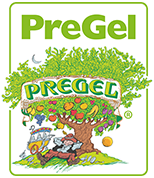If the culinary world had a boxing match, the headliner would be fresh ingredients versus powdered/concentrate ingredients. Trending are locally sourced, organic ingredients, which we can all appreciate, but are the alternatives really all that bad? In the culinary world, every ingredient out there serves a purpose. Today’s underdogs, the powders, concentrates and innovative ingredients that aren’t per se “fresh,” still have a place in this world, it may just require a further understanding of when to use them. Egg whites are revered in pastry kitchens for their multifaceted uses but they are delicate ingredients that require tedious handling hence the perfect ingredient for our case study of fresh versus powdered ingredients.
 Egg white powder is simply freeze dried albumen. However, products such as PreGel’s Albumissimo are available that contain freeze dried and sprayed egg whites with sugar and stabilizers such as locust bean gum and guar gum. The stabilizers both work to help with the structure and shelf-life of the egg whites, therefore taking away some of the delicacy fresh egg whites present. To use, the powder requires that it is rehydrated with a liquid and in the most basic of recipes that liquid would be water, however it can be combined with a number of liquids depending on the end application.
Egg white powder is simply freeze dried albumen. However, products such as PreGel’s Albumissimo are available that contain freeze dried and sprayed egg whites with sugar and stabilizers such as locust bean gum and guar gum. The stabilizers both work to help with the structure and shelf-life of the egg whites, therefore taking away some of the delicacy fresh egg whites present. To use, the powder requires that it is rehydrated with a liquid and in the most basic of recipes that liquid would be water, however it can be combined with a number of liquids depending on the end application.
The advantages of an egg white powder are bountiful. The obvious is it cuts down on labor as there’s no need to separate the egg whites, which therefore cuts down on grocery orders and trash. With food safety as a top concern, fresh egg whites can run the risk of salmonella; powdered egg whites eliminate this fear of undercooking any dish that requires them. Egg white powder also has a much longer shelf-life that doesn’t require refrigeration and can be stored at room temperature. Egg white powder when stored properly can last over a year.
Egg white powder is also a proponent of consistency. From batch to batch, they ensure that texture, flavor, etc. is consistent – fresh egg whites just like fruits are never the same. Because egg white powders are already pasteurized and dry, they can easily be incorporated into the dry mixes without heating or thawing.
In more technical terms, in brands such as PreGel’s Albumissimo, the added stabilizer helps promote a better bond between the proteins which can yield longer-lasting foam, decreasing the weeping of liquids back out of the foam. The concentration of the egg powder also allows for more proteins to be introduced into foams as well. The most noted dessert application for egg whites is meringue. The use of egg white powder in meringues lessens the chance of over whipping and yields a stronger structure. The chart below highlights the scenarios in which an egg white powder would be recommended and when fresh egg whites are preferable:
|
|
|
|
High volume bakery and large buffet dessert preparation |
Smaller batches of desserts |
|
Innovative techniques – egg white powder can be rehydrated with any flavored liquids – fruit and veggie purees, teas, herbal infusions, etc. |
When it’s important to present a fresh-made dish – it’s hard to replace the freshness that egg whites can lend to macarons and dacquoise |
|
Any recipes that require a meringue – egg white powder can enhance it |
When meringue is the main focus (i.e. Lemon Meringue Pie) |
|
Recipes that can only use an egg white powder: marshmallows, dried meringue cookies and garnishes, royal icing, decorator’s icing, etc. |
When time, adequate stuff and fresh egg whites are available |
The verdict: The use of egg white powder can both coexist and replace fresh egg whites. For many kitchens, having the option of both is a smart and efficient move for businesses looking to streamline processes and continue to keep innovation at the forefront of their operations. So in the case of fresh versus powdered, I’d call this one a draw.
